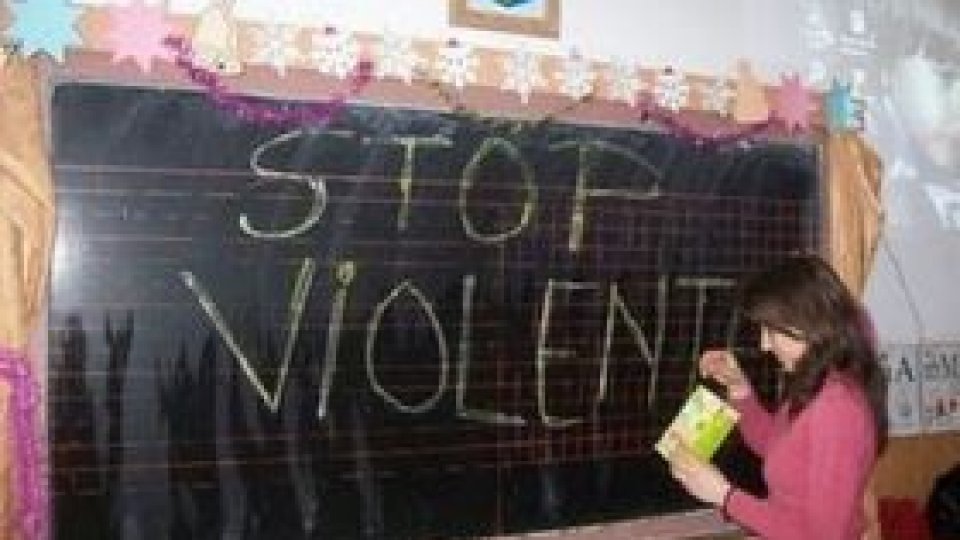Violence in schools "reached alarming levels"
Ministry of Education figures show that every day in schools in Romania are over 70 cases where students have consumed alcohol, fought, stole from colleagues or discriminated others.

Articol de Sorin Solomon, 08 Iunie 2012, 07:50
In the last three months there were 4134 cases of school violence.
Confronted with a phenomenon that shows preliminary report on violence in schools, increasing, Liviu Pop, Interim Minister announces consultation with civil society representatives, but also with authorized structures of the Ministry of Interior, Radio România Actualităţi reporter Cristina Iliescu broadcasted.
The Interim Minister of Education, Liviu Pop, recently announced that he would develop a national action plan on medium and long term to prevent and combat the violence.
Ministry of Education figures show that every day in schools in Romania are over 70 cases where students have consumed alcohol, fought, stole from colleagues or discriminated others.
Although there is now a strategy to combat the violence, but also a strategic project funded by the European Social Fund, the provisions of these documents are not respected, says Constantin Şerban Iosifescu, the president of the Romanian Agency for Quality School Education.
"The problem is not to do more than before, but to apply what was planned. We have many plans and strategies that remain only on paper," says Constantin Şerban Iosifescu.
Constantin Şerban Iosifescu says that the anti-violence program will be effective only insofar as its implementation will be monitored and evaluated.
"In general, in everything education is, the influence of student’s origin environment is very high, including academic achievement. There is then the teacher’s attitude to certain categories of students, discrimination, for instance. Another question that can be identified is the desire of children to be known.
"I do not know if you noticed, many fights, for instance, between children or violent acts are posted on YouTube and this comes from the child’s need to be accepted" says Constantin Şerban Iosifescu.
Parents are concerned
National Federation of Parents Associations has declared, in turn, concerned about the large number of cases of violence in schools.
"We are also worried about the increasing phenomenon of violence in school, on street, violence whose victims are our children.
"We have shown willingness to cooperate and we must intervene and change our behaviour towards our children and try to change something in their education, and this we can do along with school," said Mihaela Gună, the federation president.
In the following period, the officials of the education ministry will have consultations with civil society representatives, committees and associations of parents of specialized NGOs, representatives of the Ministry of Interior to identify optimal solutions for stopping violence in schools.
One possible explanation for the increase in the number of violence in schools would be, according to specialists, the lack of family guidance, given that in Romania are, according to Department for Child Protection statistics, over 80,000 children whose parents have gone to work abroad.
Lack of parents "develops the deviant behavior"
Nongovernmental organizations say that the number of children left behind by parents would be much higher; however, beyond the figures, the experts determined that a young orphan without parents next to him develops in most cases a deviant behaviour, broadcasts the Radio Romania Actualităţi correspondent Alice Georgescu.
Children whose parents are working abroad develop emotional trauma, have poor school performance, and many of them get out of school, engaging in delinquent behavior.
The emotional and educational problems remain unsolved due to the lack of social workers, of child care by persons unable to handle them properly, but also because, in the absence of parents, children cannot be represented in relation to State institutions.
Most children are in the care of relatives of fourth grade, but there are children in the care of people with no degree of kinship, which are paid to care for them.
In these conditions, the lack of assistance from state institutions or the community can affect on long-term the child’s personality.
A better cooperation of social services with schools and those who take care of children could provide a better protection and their normal development.
Soros Foundation points out that currently there are no statistics showing the exact number of children with parents working abroad, so it is necessary to identify the correct number of children in this situation, but also to organize courses for empowerment of parents and people who take care of them.
Translated by Alexandra-Diana Mircea
MTTLC, Bucharest University














